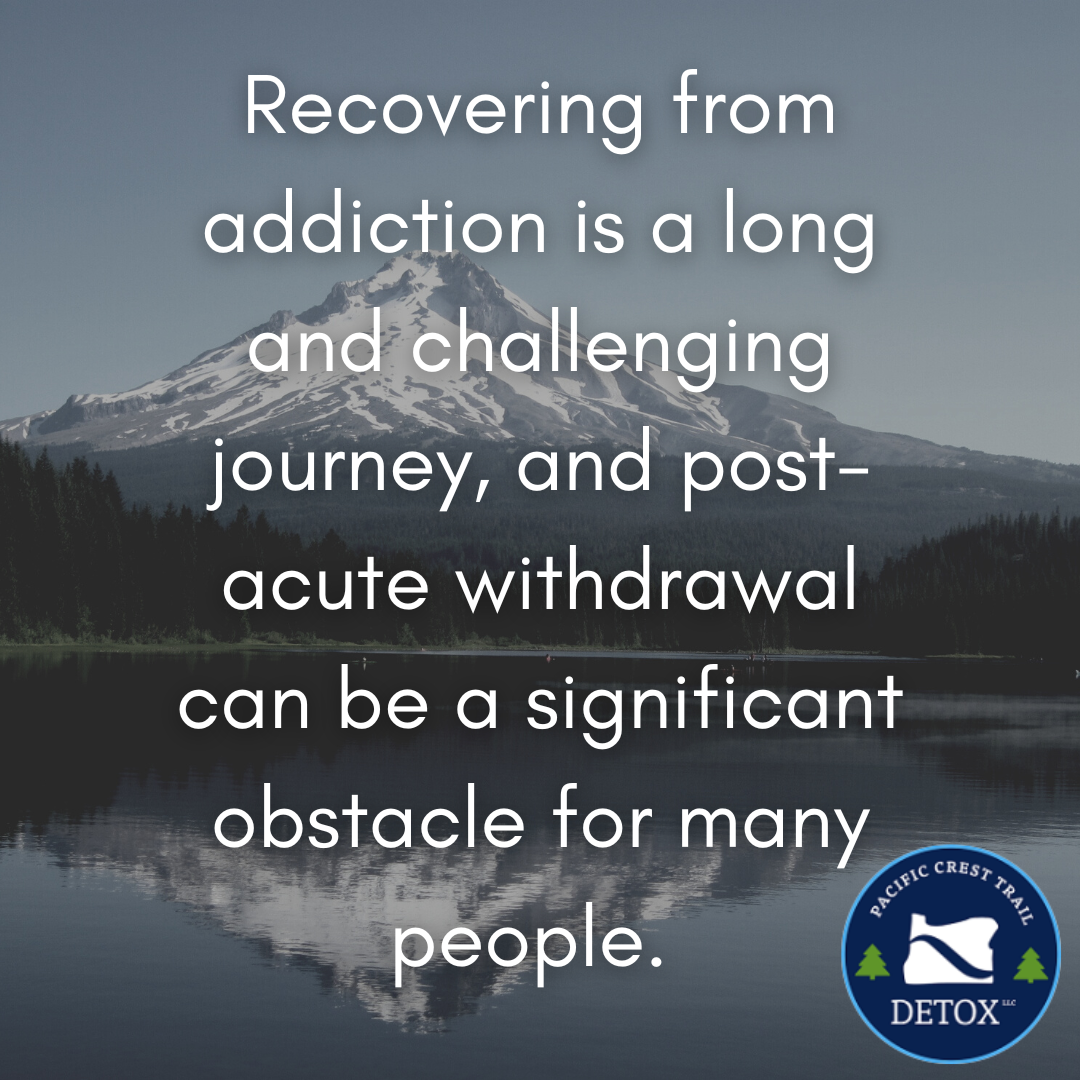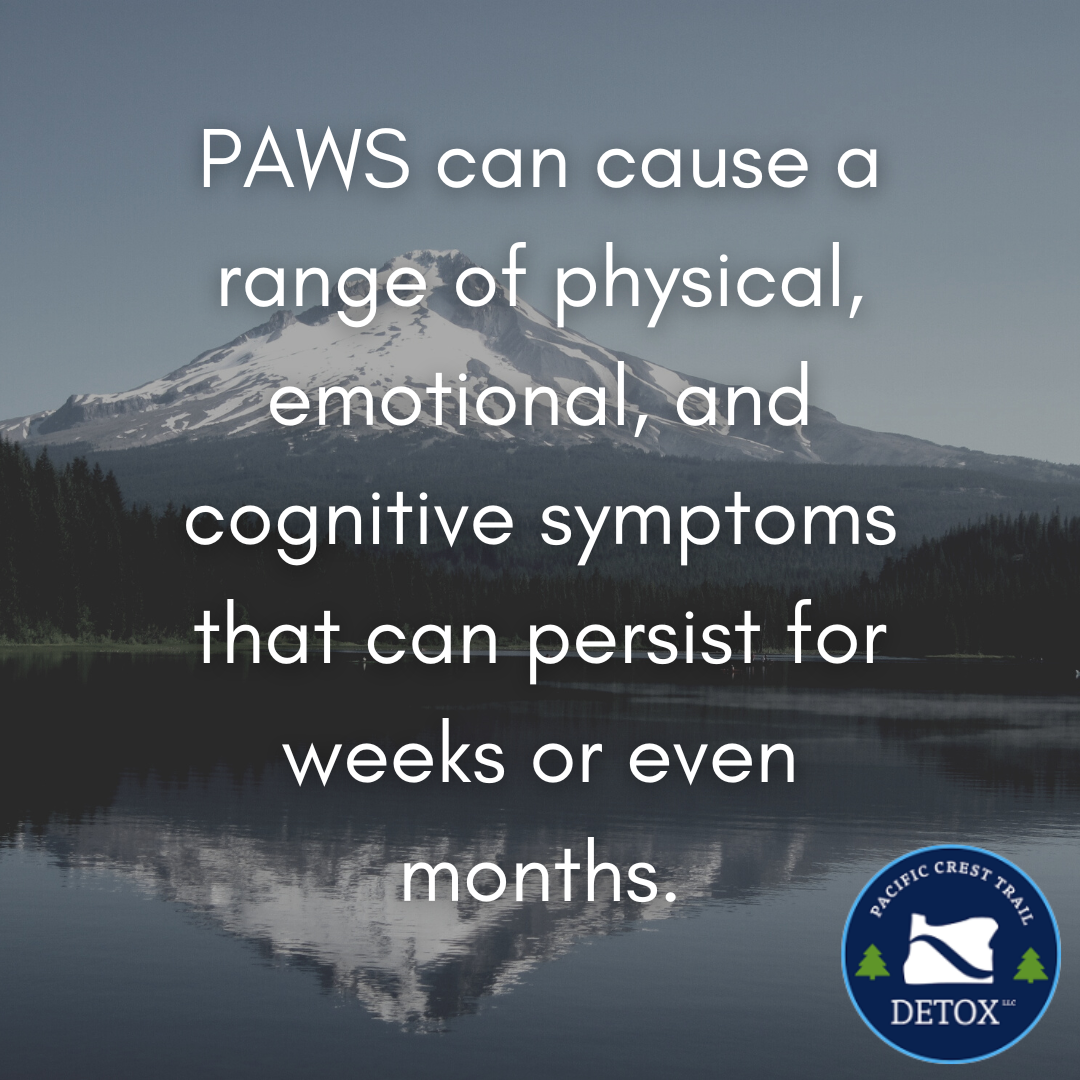Recovering from addiction is a long and challenging journey, and post-acute withdrawal can be a significant obstacle for many people. This condition can cause physical and emotional symptoms that persist for weeks or months after quitting drugs or alcohol.
In this article, we'll explore post-acute withdrawal, why it happens, and how you can manage its symptoms and stay on track with your recovery. Whether you're in the early stages of sobriety or have been in recovery for a while, understanding post-acute withdrawal can help you navigate the ups and downs of addiction recovery more effectively.
 Source: Pacific Crest Trail Detox
Source: Pacific Crest Trail Detox
What is Post Acute Withdrawal Syndrome?
Post Acute Withdrawal Syndrome (PAWS) refers to symptoms that can persist for weeks or months after the acute withdrawal phase of drug or alcohol detoxification. PAWS can be a significant barrier to long-term recovery and is associated with a higher risk of relapse.
Causes and Risk Factors
PAWS is caused by changes in the brain and nervous system resulting from long-term substance abuse. The brain becomes accustomed to the presence of drugs or alcohol and undergoes significant adaptations to maintain balance. When these substances are removed, the brain must readjust to the absence of the essence. This can cause various physical and psychological symptoms, including anxiety, depression, insomnia, and physical discomfort.
Risk factors for developing PAWS include the duration and severity of substance abuse, genetic predisposition, co-occurring mental health disorders, and other factors affecting brain function, such as trauma or chronic stress.
Duration and Timeline
The duration and timeline of PAWS can vary depending on the individual and the substance involved. Generally, symptoms can persist for several weeks to several months, with some individuals experiencing symptoms for up to a year or more.
PAWS typically begins a few days after the acute withdrawal phase and can last for several weeks.
Symptoms may improve over time, but they can also come and go in waves, making recovery challenging. It is essential to seek professional help and support to manage symptoms effectively and avoid relapse.
 Source:
Pexels.com
Source:
Pexels.com
Symptoms of PAWS
PAWS can cause a range of physical, emotional, and cognitive symptoms that can persist for weeks or even months after quitting drugs or alcohol. Recognizing these symptoms and seeking professional help to manage them effectively and avoid relapse is essential.
Emotional and psychological symptoms
PAWS can cause various emotional and psychological symptoms, including anxiety, depression, irritability, mood swings, and difficulty concentrating. These symptoms can be challenging to manage and significantly impact an individual's mental health and quality of life. It is essential to seek professional help and support to address these symptoms and develop healthy coping strategies.
Physical symptoms
PAWS can also cause various physical symptoms, including fatigue, insomnia, headaches, muscle aches, and digestive problems. These symptoms can be uncomfortable and affect an individual's functioning ability. It is essential to seek medical attention to manage these symptoms effectively and address any underlying health issues.
 Source: Pacific Crest Trail Detox
Source: Pacific Crest Trail Detox
Cognitive symptoms
PAWS can also affect cognitive function, including memory, attention, and problem-solving skills. Individuals may need help with decision-making, organization, and planning, making it challenging to manage daily tasks effectively. It is essential to seek professional help and support to address these symptoms and develop healthy coping strategies, such as mindfulness and cognitive-behavioral therapy.
How to Manage PAWS Symptoms
Managing PAWS symptoms is crucial for long-term recovery from addiction. With the right treatment and support, individuals can overcome the challenges of PAWS and maintain their sobriety. Here are some ways you can manage PAWS symptoms:
Medications and supplements
Medications and supplements can help manage PAWS symptoms. Antidepressants, anti-anxiety medications, and sleep aids can be prescribed to alleviate emotional and psychological symptoms. Nutritional supplements, such as vitamins and amino acids, can also support brain health and reduce cravings. Working with a medical professional is essential to determine which medications and supplements are right for you.
Therapy and support groups
Therapy and support groups can provide valuable support and guidance for individuals experiencing PAWS. Cognitive-behavioral therapy (CBT) can help individuals develop healthy coping strategies and manage emotional and psychological symptoms. Support groups, such as Alcoholics Anonymous (AA) or Narcotics Anonymous (NA), can provide community support as individuals navigate recovery challenges.
 Source:
Pexels.com
Source:
Pexels.com
Lifestyle changes
Lifestyle changes can also play a crucial role in managing PAWS symptoms. Eating a healthy diet, exercising regularly, and getting enough sleep can support overall health and reduce symptoms such as fatigue and insomnia. Mindfulness practices like meditation or yoga can also help reduce stress and anxiety. Developing a holistic approach to recovery that addresses physical, emotional, and spiritual well-being is essential.
PAWS and Addiction Recovery
PAWS can be a significant challenge for individuals in addiction recovery. Understanding the impact of PAWS on recovery and developing effective strategies to manage symptoms can improve the chances of long-term success.
PAWS can be a barrier to recovery as it can cause significant discomfort and trigger cravings, increasing the risk of relapse. Individuals in recovery need to recognize PAWS symptoms and seek professional help and support to manage them effectively.
Developing healthy coping strategies, such as therapy, support groups, and lifestyle changes, can help individuals manage the emotional, psychological, and physical symptoms of PAWS. It is also crucial to address any underlying mental health issues that may contribute to PAWS symptoms, such as anxiety or depression.
In addition to managing PAWS symptoms, individuals in addiction recovery must also develop a comprehensive relapse prevention plan. This plan should include strategies to address triggers, avoid high-risk situations, and manage stress and anxiety effectively.
Conclusion
In conclusion, Post-Acute Withdrawal Syndrome (PAWS) can significantly challenge individuals in addiction recovery. Understanding the symptoms of PAWS, developing healthy coping strategies, and having a comprehensive relapse prevention plan can improve the chances of long-term success.
Managing PAWS symptoms requires a comprehensive approach that addresses physical, emotional, and psychological health. Medications, supplements, therapy, support groups, and lifestyle changes can help manage PAWS symptoms.
If you or someone you know is struggling with addiction and experiencing PAWS symptoms, seeking professional help and support is crucial. Pacific Crest Detox offers comprehensive addiction treatment services that can help individuals manage the challenges of PAWS and achieve long-term recovery. Contact Pacific Crest Detox today to learn more about our addiction treatment programs and how we can help you or your loved one achieve lasting sobriety.
